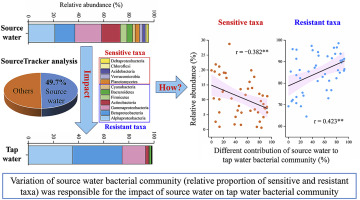Water Research ( IF 11.4 ) Pub Date : 2020-01-03 , DOI: 10.1016/j.watres.2020.115469 Ziming Han , Wei An , Min Yang , Yu Zhang

|
Drinking water purification and distribution processes shape the bacterial community in tap water; however, this study calls attention to the impact of source water on tap water bacterial community. Herein, paired source and tap water samples were collected from 46 drinking water supply systems in different watersheds across China, and high-throughput sequencing delineated that bacterial richness and diversity decreased and biogeographical distribution pattern weakened in tap water compared to source water. Despite the great changes of bacteria from source to tap, Bayesian-based SourceTracker analysis still verified that the proportional contributions of source water to shaping the tap water bacterial community ranged from 0% to 92.8% (49.73% ± 30.22% on average). This indelible contribution was further confirmed by the Mantel test (P < 0.001), Procrustes test (P < 0.001) and variance partition analysis, which showed that the source water together with geographical location explained 40.11% of tap water bacterial community variation. To explore the potential reasons that explain the great differences in the impact of source water among different samples, the universal shift pattern of bacterial communities from source to tap was summarized as a classification of dominant bacterial taxa: “sensitive taxa” versus “resistant taxa”. The taxa including Planctomycetes, Verrucomicrobia, Acidobacteria, Chloroflexi, and δ-Proteobacteria could act as biomarkers to distinguish samples between source and tap water, and were classified as sensitive taxa. In contrast, α-Proteobacteria, β-Proteobacteria, γ-Proteobacteria, Actinobacteria, Firmicutes, Bacteroidetes, and Cyanobacteria were classified as resistant taxa. The abundance of sensitive taxa was negatively correlated with the SourceTracker proportion, while the abundance of resistant taxa was positively correlated with the SourceTracker proportion (P < 0.01). Thus, variation in source water bacterial community could be responsible for the degree of impact on tap water. Our findings give notice that the impact of source water microbiomes must be taken more seriously, and sufficient source water protection and engineering control strategies should be implemented to prevent the biological consequences of source water on tap water.











































 京公网安备 11010802027423号
京公网安备 11010802027423号